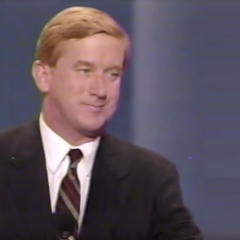A Moment on the Libertarian Convention Floor With William Weld
The former Massachusetts governor is "good friends" with Mitt Romney, but reluctant to reach out to GOP pals until he knows his Libertarian campaign has traction.
From the floor of the Libertarian Party National Convention in Orlando, I managed to get a brief moment face to face with William Weld, the former Massachusetts governor who is likely presidential frontrunner Gary Johnson's personal choice to be his vice president. (I'll be posting more on how seriously Johnson takes needing Weld with him shortly. Pretty seriously, at any rate.) I was with Jeff Tucker of the Foundation for Economic Education, who was talking to Weld first. Below, his responses to Jeff's comments, first asking why he was doing this third party run.

"I think this is a shot at cutting the size and role of government, which is my number one issue. It's the reason I've been a Republican as opposed to a Democrat. It's the reason I've turned Libertarian vs. Republican," Weld says.
"Spending restraint is something of a relic of the past among Republicans," Weld continued. "And what I really can't take is the movement conservative, social conservative anti-abortion and ant-gay, anti-lesbian…" Tucker brings up the drug war.
Weld talks about a legal emphasis on treatment vs. criminalization when it comes to drugs, treating the issue as a "public health emergency rather than a crime." (That's reformist, to be sure, but still annoying for those libertarians who want to see the government more or less ignore private drug use.)
Tucker asked if Trump was what made Weld bolt the GOP. "That moment came for me before Trump," Weld says. "I don't consider Gary and I as anti-Clinton or anti-Trump. It's based on the premise that we don't agree with either party.
"I used to be an enthusiastic Republican. I worked for [New York Republican senator] Jack Javits when lions still strode the earth, when Republicans were good guys and we were the free traders, we were as socially progressive as we wanted to be. Even when I worked for Reagan [in his Justice Department in the mid-'80s] half of us were self-described libertarians, including me.
"The other half were self-described social conservatives. That would be the anti-abortion crowd, they were also anti-gay by the way and overtly so. It you are not with the anti-abortion brigade in today's Republican Party in Washington you're nobody and that's very unattractive."
The decision to link up with Johnson was easy, Weld says, since "I've known Gary since his first election as governor. His first term was my second and we saw a lot of each other at Republican governors' meetings and we hit it off. In 1991 when I hit office I used executive orders on gay and lesbian issues and people were scandalized. No other governor or senator would touch those issues with a 10-foot pole. My chief of staff and head of the tax department were gay partners. People couldn't get over it. They didn't know what to make of it. After I got 71 percent (in his re-election bid) the national Party had to cut me slack and leave me alone."
I saw Weld last night debate three people who were not, suffice it to say, nearly as experienced in politics as he is. What was that like?
"I got to say what I wanted to say last night, " he says. "In substance it was fine. Obviously my voice was not as elevated as some of others, in terms of volume. But I was satisfied."
"It was a little unusual," he admits.
I ask him if Mitt Romney, a fellow Massachusetts Republican governor, was a friend.
"Mitt Romney is a friend, but I'm not about to call him on this thing," Weld says. "It's premature. I want money in the kitty, to make sure no more third party people are coming. I want a clear shot at 15 percent or over and have the credibility [for outsiders to think] 'these guys should be in the debates.'"
"Mitt is a close friend," Weld admits. "But there has been no direct communication [about Weld's Libertarian run]. There won't be for at least a month. It will take that long to know whether we are getting any nibble on the financial end."


Show Comments (124)